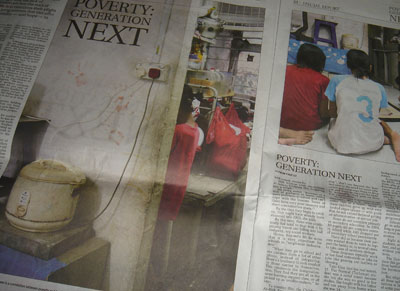A Country of Maximizers
Hou, The Students' Notebook

"Brown, but my first choice was Yale." Does that sound familiar to many students in Singapore?
Schwartz, in his book "The Paradox of Choice : Why More Is Less", speaks about the concept of maximizers. The definition is given as the group of people who will seek and accept nothing but the best, and absolutely the best when it comes to decision in their lives.
He then goes and point out the causes and its consequences of such : Maximizers exist because of the concern with status, in particular when it comes to social comparison (i.e. self vs. expectations, self vs. others). The contemplation of more choices in turn leads to regret, and less self-satisfaction on the choices we have made.
Our society has grown increasingly competitive, to the point of being a rat race. The school rankings table some years ago have caused schools to up the ante with each passing year, turning educators into maximizers and the concept reinforced upon students. Parents fight for a place in a good primary spot, wanting to see that their children have the best. (Schwartz, p. 77-96)
It's not difficult to spot the trend - We are all increasingly becoming a country of maximizers. Many of us, faced by circumstances (such as elitism and bigotry), has made us feel compelled to be maximizers, not wanting to fall behind. I mean, who wants to fall behind and get looked down by others? Jack Neo's box-office hit "I Not Stupid" is a gentle reminder of such.
Adam Khoo, on his book "I Am Gifted, So Are You!", claims that one's failure is absolutely his/her own fault, and nobody else. To think otherwise is to have a mentality of a loser, and one should be a winner's mentality by converting all the negative emotions, and do whatever it takes to drive the person to success. (Khoo, p. 18-19)
It is noted, that the book is a form of neuro-linguistic programming (NLP), and this form of development by itself is not without controversy. It advocates that self-responsibility is the sole factor of its causes, but is this always the case as such? Interestingly, what it did say is that it won't work for 95% of the population because they have a loser's frame of mind. (Khoo, p. 16-18)
Or...is it that NLP is ineffective in the first place?
If the person succeeds, that is fine with me. What if he/she does not? Then the psychological effects would be devastating to one's well-being. Schwartz warns that allocating excessive self-blame leads to even more helplessness, depression, or worse. In addition, maximizers tend to be more susceptible to such, and are less happier. (Schwartz, p. 201-217) It may be irrational to blame everything else except oneself when it comes to failure, but does that mean one should simply take all of it?
Schwartz has many suggestions, but I think this one has got to be my personal favourite for our fellow Singapore students (on why we should resist the tendancy to make social comparisons)

And following that, "remember, it's a bumper sticker, not wisdom!" (Schwartz, p. 224)
Failing which, I would truly worry about my personal well-being.

"Brown, but my first choice was Yale." Does that sound familiar to many students in Singapore?
Schwartz, in his book "The Paradox of Choice : Why More Is Less", speaks about the concept of maximizers. The definition is given as the group of people who will seek and accept nothing but the best, and absolutely the best when it comes to decision in their lives.
He then goes and point out the causes and its consequences of such : Maximizers exist because of the concern with status, in particular when it comes to social comparison (i.e. self vs. expectations, self vs. others). The contemplation of more choices in turn leads to regret, and less self-satisfaction on the choices we have made.
Our society has grown increasingly competitive, to the point of being a rat race. The school rankings table some years ago have caused schools to up the ante with each passing year, turning educators into maximizers and the concept reinforced upon students. Parents fight for a place in a good primary spot, wanting to see that their children have the best. (Schwartz, p. 77-96)
It's not difficult to spot the trend - We are all increasingly becoming a country of maximizers. Many of us, faced by circumstances (such as elitism and bigotry), has made us feel compelled to be maximizers, not wanting to fall behind. I mean, who wants to fall behind and get looked down by others? Jack Neo's box-office hit "I Not Stupid" is a gentle reminder of such.
Adam Khoo, on his book "I Am Gifted, So Are You!", claims that one's failure is absolutely his/her own fault, and nobody else. To think otherwise is to have a mentality of a loser, and one should be a winner's mentality by converting all the negative emotions, and do whatever it takes to drive the person to success. (Khoo, p. 18-19)
It is noted, that the book is a form of neuro-linguistic programming (NLP), and this form of development by itself is not without controversy. It advocates that self-responsibility is the sole factor of its causes, but is this always the case as such? Interestingly, what it did say is that it won't work for 95% of the population because they have a loser's frame of mind. (Khoo, p. 16-18)
Or...is it that NLP is ineffective in the first place?
If the person succeeds, that is fine with me. What if he/she does not? Then the psychological effects would be devastating to one's well-being. Schwartz warns that allocating excessive self-blame leads to even more helplessness, depression, or worse. In addition, maximizers tend to be more susceptible to such, and are less happier. (Schwartz, p. 201-217) It may be irrational to blame everything else except oneself when it comes to failure, but does that mean one should simply take all of it?
Schwartz has many suggestions, but I think this one has got to be my personal favourite for our fellow Singapore students (on why we should resist the tendancy to make social comparisons)

And following that, "remember, it's a bumper sticker, not wisdom!" (Schwartz, p. 224)
Failing which, I would truly worry about my personal well-being.


 From the creators of The Students' Sketchpad et alii,
bringing you reports and commentary on educational
issues that sink deep into students' hearts and minds.
From the creators of The Students' Sketchpad et alii,
bringing you reports and commentary on educational
issues that sink deep into students' hearts and minds.